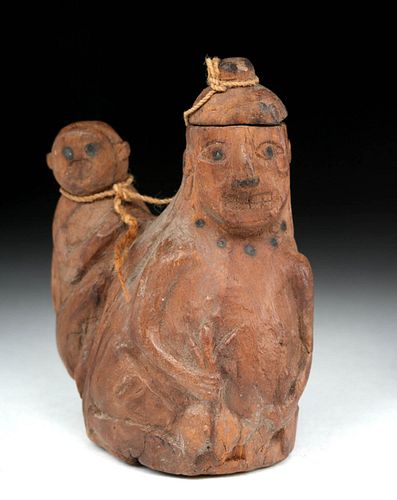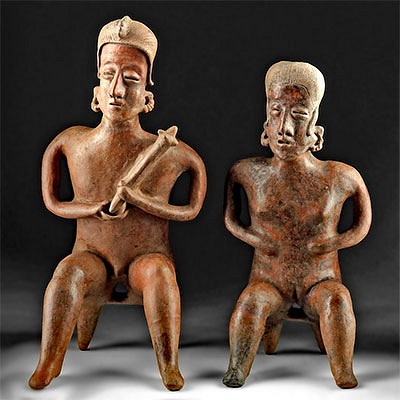Pre-Columbian Sihuas Wood Poporo, ex-Butterfields
Lot 140b
About Seller
Artemis Fine Arts
686 S Taylor Ave, Ste 106
Louisville, CO 80027
United States
Selling antiquities, ancient and ethnographic art online since 1993, Artemis Gallery specializes in Classical Antiquities (Egyptian, Greek, Roman, Near Eastern), Asian, Pre-Columbian, African / Tribal / Oceanographic art. Our extensive inventory includes pottery, stone, metal, wood, glass and textil...Read more
Categories
Estimate:
$1,100 - $1,650
Absentee vs Live bid
Two ways to bid:
- Leave a max absentee bid and the platform will bid on your behalf up to your maximum bid during the live auction.
- Bid live during the auction and your bids will be submitted real-time to the auctioneer.
Bid Increments
| Price | Bid Increment |
|---|---|
| $0 | $25 |
| $300 | $50 |
| $1,000 | $100 |
| $2,000 | $250 |
| $5,000 | $500 |
| $10,000 | $1,000 |
| $20,000 | $2,500 |
| $50,000 | $5,000 |
| $100,000 | $10,000 |
| $200,000 | $20,000 |
About Auction
By Artemis Fine Arts
Mar 25, 2021
Set Reminder
2021-03-25 10:00:00
2021-03-25 10:00:00
America/New_York
Bidsquare
Bidsquare : CLEARANCE Antiquities | Ethnographic Art
https://www.bidsquare.com/auctions/artemis-gallery/clearance-antiquities-ethnographic-art-6663
Featuring discounted pricing on Asian art, Classical antiquities from Egypt, Greece, Italy, and the Near East...plus Pre-Columbian, Tribal, Russian Icons, Spanish Colonial, Fine Art, more! Artemis Fine Arts info@artemisfinearts.com
Featuring discounted pricing on Asian art, Classical antiquities from Egypt, Greece, Italy, and the Near East...plus Pre-Columbian, Tribal, Russian Icons, Spanish Colonial, Fine Art, more! Artemis Fine Arts info@artemisfinearts.com
- Lot Description
**Originally Listed At $750**
Pre-Columbian, Peru, Sihuas Valley Culture, ca. 400 to 700 CE. A hand-carved wooden poporo in the form of a human with a monkey on his or her back. The figure holds what appears to be two potatoes or some other tuber in his or her hand; the arms are carved as part of the body, as are the tubers. The monkey has a leering face with a massive grin and a long, thin tail carved to curl up its back. The figure has wide eyes and wears a hat that is removable, forming the lid of the vessel. Size: 1.5" W x 2" H (3.8 cm x 5.1 cm).
A poporo is a container for lime used in the ingestion of coca leaves. From the earliest times, people in the Andes had a tradition of using coca leaves for ritual purposes. They were ingested by placing some of the leaves in the mouth and adding a small quantity of powdered lime, ground from seashells. The poporo was often elaborately conceived, with figural form. Monkey iconography in the Andes was associated with coca and snuff rituals. Some researchers have suggested that, because monkeys and some forms of the drug came from the Amazon Basin, they were culturally associated. For example, there are many depictions on pottery vessels of monkeys holding some kind of drug paraphernalia - holding a coca bag or a poporo.
Provenance: private, Hawaii, USA collection; purportedly ex-Butterfields, San Francisco, California, in the 1980s
All items legal to buy/sell under U.S. Statute covering cultural patrimony Code 2600, CHAPTER 14, and are guaranteed to be as described or your money back.
A Certificate of Authenticity will accompany all winning bids.
We ship worldwide and handle all shipping in-house for your convenience.
#132530Patina from touch and age on the surface; nice pigment remaining. Slight wear on the surface.Condition
- Shipping Info
-
All shipping is handled in-house for your convenience. Your invoice from Artemis Gallery will include shipping calculation instructions. If in doubt, please inquire BEFORE bidding for estimated shipping costs for individual items.
-
- Buyer's Premium



 EUR
EUR CAD
CAD AUD
AUD GBP
GBP MXN
MXN HKD
HKD CNY
CNY MYR
MYR SEK
SEK SGD
SGD CHF
CHF THB
THB


















